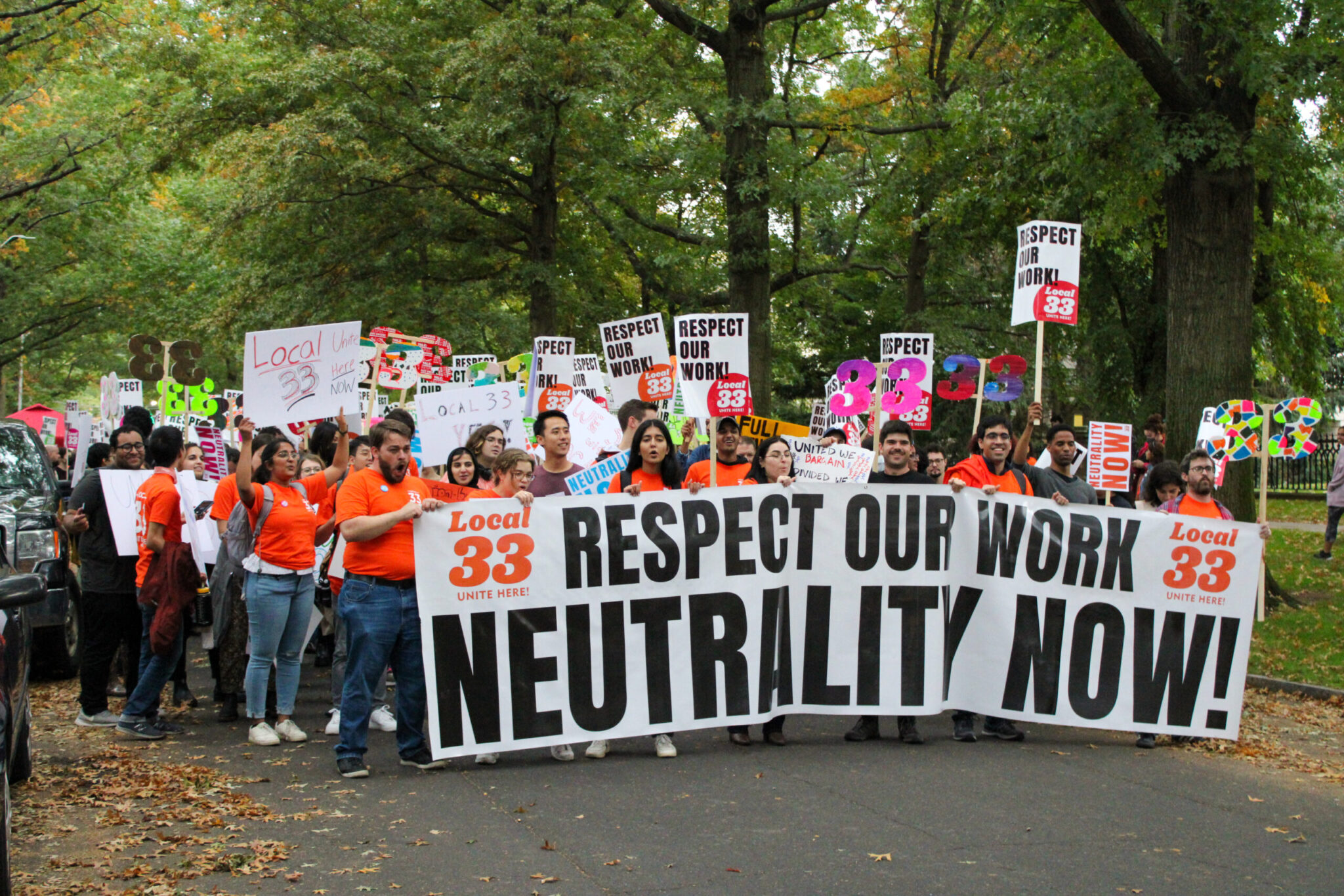Graduate students reflect on new union contract
After Local 33 UNITE HERE ratified its first contract with the University last December, graduate workers are celebrating affordable insurance plans and pay raises.

Abraham Payne, Contributing Photographer
For Camila Marcone GRD ’27, a graduate worker in Medieval Studies, her new union contract will alleviate much of the financial burden of her pregnancy and her husband’s upcoming parental leave.
Marcone, who is five months pregnant, said that she hopes the contract provisions Local 33 UNITE HERE, Yale’s graduate and professional worker union, secured in December, will make the choice to become parents easier for Yale’s graduate workers.
“I will get emotional talking about [the contract],” Marcone, who served on the union’s bargaining committee, said. “I think it’s industry-leading. It’s fantastic … I feel really proud to have been part of the team, and part of a movement that has put together this amazing contract in good faith negotiations. And then I can say that I also did this for my daughter.”
Beyond salary raises that make Yale’s graduate workers the highest paid in the Ivy League, the union’s first contract with the University secures expanded health and dental care, increased protections for international students and guaranteed union recognition until 2031.
Jake Thrasher GRD ’24, a graduate worker in the Molecular Biophysics and Biochemistry Department who also served on the bargaining committee, reiterated the substantial impact the raises will have on his life. Coming from a working-class background, Thrasher said that the raises will ease financial pressure and allow him to concentrate on his research.
Paul Seltzer GRD ’25, a graduate worker in the history department, told the News that he is most excited about the contract’s free spousal health care. When Seltzer began studying at Yale, his partner underwent sudden medical issues, forcing the two to consider getting married in order to add her as a spouse to his graduate worker health insurance. However, he said that the cost to add her, in the thousands of dollars, was too expensive for the couple.
“I am really proud that now we have a guarantee for grad workers with spouses that they can be on it for free,” Seltzer said of the insurance. “I think it is going to make living and working at Yale a lot more affordable and accessible.”
Seltzer also pointed to the strength of the national graduate workers organizing movement, noting that the new generation of graduate workers will know what it feels like to be “empowered” at work.
Benjamin Sanders GRD ’26, a graduate worker in the interdepartmental neuroscience program who organizes with Local 33, told the News that he is “very excited” about the contract’s affordable dental care plan, especially considering that most of the time students are cut off from their parents’ dental insurance at the age of 26.
Marcone also praised the new grievance procedure outlined in the contract, which guarantees a union steward throughout the complaint process. She said that the new procedure will make her feel “safer” if she asks for pregnancy accommodations.
For Christopher Lindsay GRD ’26 and John Gonzalez GRD ’24, who serve as the Graduate Student Assembly chair and vice chair, respectively, the contract will improve workers’ lives, but also reveals a tension in graduate workers’ simultaneous role as students and workers.
“My most basic feelings on unionization, and what I imagine are the feelings of most Ph.D. students and graduate instructors, are that ‘unionization is good because we get paid more,’” Lindsay wrote in an email to the News. “If I were thinking more about what this means for the future of graduate education at Yale and other universities, I think my feelings, particularly for graduate students doing research, are more complicated.”
Lindsay explained that the role of graduate and doctoral student workers has changed greatly over the past few years.
He said that he believes there is a “balance” that can be achieved with being both workers and students, but that it will take effort to “figure out what that balance is.”
Lindsay wrote to the News that Ph.D. students have always been both workers and students, but that in previous years this role was more of an “academic apprenticeship,” with the understanding that Ph.D. students go into careers in academia. Nowadays, Lindsay wrote, with graduate school admissions becoming more selective, the students who are admitted to Yale’s doctorate programs are already strong researchers. Instead of focusing on training, Lindsay explained, students focus more on producing research for their advisors, shifting the advisor-student relationship into more of a manager-worker one.
“In recent years, though, the role of the graduate student as a worker has become more top of mind and through this change, the push for unionization made more and more sense,” Lindsay wrote.
Gonzalez wrote to the News that he believes the agreement is “a huge step forward” in fair treatment of graduate student workers at the University.
Gonzalez also acknowledged some concerns with the contract. He said that one graduate student, for example, told him that they were unsure of how much of their time would be considered labor and how much of it would be protected for their student training. Student training, Gonzalez explained, includes working for a teaching certificate and using the office of career services.
Gonzalez told the News that the GSA plans to discuss such concerns with the union and with deans.
“The biggest lesson for all of us – faculty, administrators, and students – now will be to better understand and give space to the duality of graduate students as students and workers,” Gonzalez wrote.
Local 33 and the University reached an agreement on the contract after nine months of bargaining.
Correction, Feb. 6: This story has been corrected to reflect that Paul Seltzer is not the co-president of Local 33.
Interested in getting more news about New Haven? Join our newsletter!







